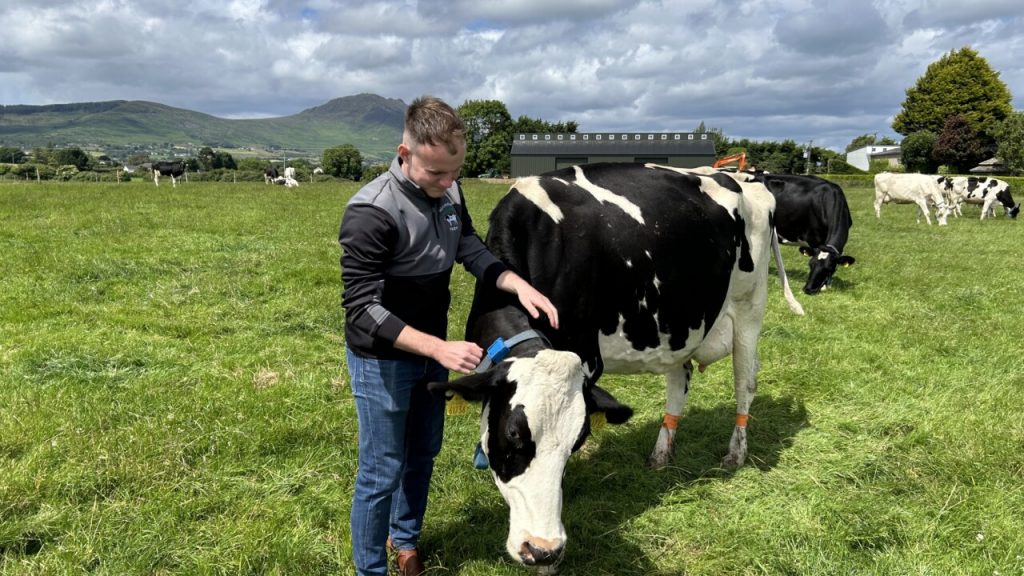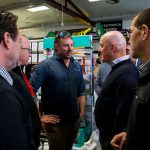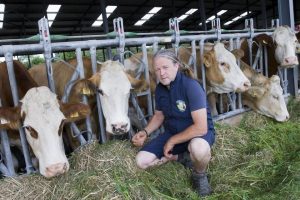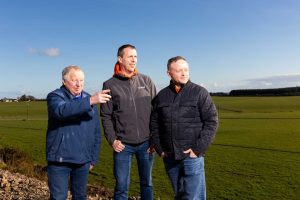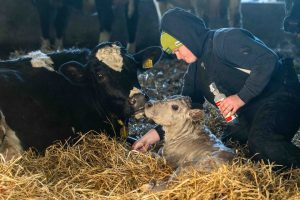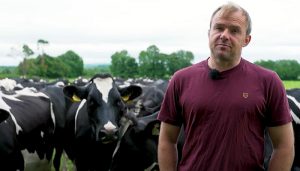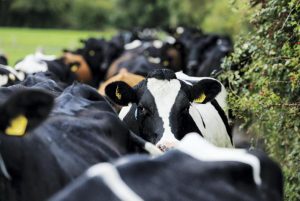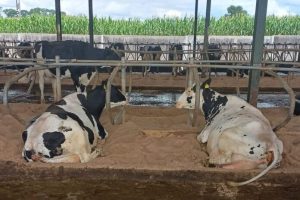
Agriland visited the Muchgrange Farm in Co. Louth where the family have been milking for four generations and have now started diversifying the family business at every opportunity.
Michael John Hanlon has just finished his agricultural degree in UCD and eyes up the opportunity of taking the family dairy farm to the next level with further diversification as he is always up for new ideas.
Michael John Hanlon with his father Ciaran and family are milking 120 pedigree holstein friesian cows on the Cooley peninsula in Co. Louth.
The type of cow on the farm is important to the Hanlons as they try and breed for a cow that can produce 7,000L of milk with 600kg/milk solids (MS).
The overall herd economic breeding index (EBI) is €191, with there being a particular focus on the health sub index, followed by milk production, fertility and the calving sub index.
Last year, the cows averaged 6,000L with 450kg/MS. This was an impressive return considering that over 40% of the herd were on their first lactation and 30% of the herd in their second lactation.
Hanlon realises that his herd is still very young and that has the potential to fulfill his milk production objectives if he can improve a few areas on the farm, including grassland management.
Grazing
Like most farms around the country, grazing has been far from easy on Muchgrange Farm this year, and Hanlon has said it has been tough as they have a very dry farm.
An ongoing problem on the farm during the summer is that paddocks burn up very quick, so, the Hanlons had to be more innovative when it came to their grass swards and management.
They have sowed clover into the majority of their existing swards and have a plan to over-sow more clover around the farm to help with the issue.


Another game changer on the farm has been the introduction of multi-specie swards which has seen better covers returning during this dry summer than any grass paddocks.
“We only grazed the multispecies about 12 days ago and already it has a cover of about 1100-1200kg DM/ha. A grass paddock that was grazed after it is still yellow looking,” he added.
The multi-specie sward is growing back a lot quicker than any perennial ryegrass on the farm, as it is less tolerant to droughts due to its deep rooting depth.
Hanlon expressed that they are producing higher dry matter yields from lower nitrogen fertiliser inputs with the multi specie and that they would be in real trouble this grazing season if they did not have it.
With the cold, dry weather this grazing season, Hanlon told Agriland that they are currently buffer feeding 7kg of maize with 3kg of meal.
Breeding
The Hanlons try to run a simple enough breeding season as they used 100 sexed semen straws on 80 cows this spring.
The cut-off point for their sexed semen is after four weeks followed by simmental and charolais beef straws used on the cows up until week 12, in conjunction with mop-up bulls. An easy calving angus bull is then used for the heifers.
They have had great success with sexed semen in recent years as 70 heifer calves calved down last spring which meant they could sell surplus heifers and choose the best for themselves.
They want a cow on the farm that has good longevity and will last in the herd for at least five lactations with good health, feet and udders.
With the introduction of bottled milk being produced on the farm, the Hanlon’s needed supply all year-round so they now have a number of cows calving in the autumn time.
“We needed to keep a fresh supply of milk throughout the winter so that’s why we began the winter milk,” Michael John said.
They use fixed time artificial insemination (AI) to get the autumn calvers in calf and this year there will be 20 cows calving down to be milked over the winter months.
Diversifying
The Hanlons started diversifying their business in July of 2021 when they started bottling their own milk and selling it from the yard.
The aim was to get more value for their product and with their being a gap in the market in their local area, they decided to start the farm shop.
“The first day of business saw huge crowds come and go with us selling 200L on the first day.”
They now sell around 600-700L a day to local business such as coffee shops and restaurants, as well as selling milk from the farm shop.



They now have a refrigerated van going around delivering to mainly coffee shops and other local businesses within a 40-50km radius.
Diversifying into the farm shop was a no brainer for the farm as they are in a tourist attraction on the Cooley peninsula and being near the beach in Carlingford there has always been customers coming and going.
The new separator also allows them to produce low-fat milk on the farm which has seen a good demand. With the extra cream being left over and going to waste, Hanlon wanted to find a way to utilise this.
With their ideal location and left over cream in mind, Hanlon decided to produce Gelato Ice cream which is a massive seller in the shop and to local restaurants.
They bought an Ice cream trailer to facilitate the demand for the Ice cream which gets great use with primary schools and events.


Hanlon plans to perfect the Gelato ice cream business before potentially diversifying into other dairy products.
He also aims to further progress the dairy farm in terms of productivity, profitability and sustainability. The dairy farmer claims that the grassland management is not as good as they want it to be and they plan to fix that problem.
“We want to further reduce our nitrogen use through clover and multi-species and further progress our herd genetics by putting a lot of thought into picking our bulls,” Hanlon added.
You can now read the most important #news on #eDairyNews #Whatsapp channels!!!
🇺🇸 eDairy News INGLÊS: https://whatsapp.com/channel/0029VaKsjzGDTkJyIN6hcP1K
